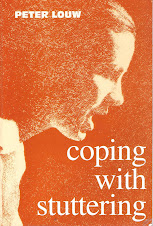 |
| Colin Firth, as the later King George VI, at Wembley in 1925 - an ordeal both for him and his listeners |
1) The movie depicts the king as a rather interiorised stutterer, with blocks rather than repetitions or prolongations.
2) He seemed to swallow a lot in order to try speaking - an old trick in an effort to open the locked vocal cords. Apparently the cords do open somewhat after swallowing, and he used this natural opening mechanism to try and speak. As with so many other anti-stuttering tricks, the swallowing trick only works temporarily, after which it loses its effectiveness and can even become a habit and part of the problem.
3) His speech coach, Lionel Logue, taught him all the tricks and therapies in the book. Though speech therapy was in its infancy (still is?), Logue seemed to do very well with techniques that became well known later - i.a. breathing and physical relaxation techniques, singing and distraction therapy (standing on your toes to avoid a block, and speaking while not being able to hear yourself). From a psychological point of view, Logue seemed to have an excellent grasp of the value of stress reduction via providing tons of sympathy and friendship.
4) It was interesting to see how the king's speech gradually improved through this friendship. He definitely relaxed and loosened up in the course of the movie, so improving his speech. There can be no doubt that kindness and friendship received reduce stress, particularly for an individual such as the king who had to function within a stressful formal, cold, strict and rigid social structure.
5) The movie shows that even fluency 'tricks', such as being fluent when you can't hear yourself speak (for example, when speaking while loud music is played in the background), can be of use - in this case it demonstrated graphically that fluency IS POSSIBLE under certain circumstances; and that there is hope.
6) On YouTube I listened to a recording of the king's real speech after war had been declared, and his speech was indeed quite good and very similar as in the movie - there were many pauses but having regard to the solemn occasion these pauses added gravitas and dignity.
7) Beautiful acting, with Colin Firth's effective use of his eyes to say so much. On occasion only his eyes show his apprehension and real fear on hearing what demands will be made on his non-existent communication skills.
A wonderful movie, never trivialising the issue nor sentimentalising it. This should do so much for public awareness of stuttering ...






I saw the movie, and the recommendation that his therapist gave him at the end during the "speech" seemed to go against everything a therapist recommends. like speaking in groups (three words at a time), or having a pre-word starter (saying a-hold instead of hold). These seem like "tricks" that give temporary relief but no net improvement.
ReplyDeleteI liked the parts in the movie about all the different therapy techniques he has tried and have failed. I can relate to those...
Yes, Logue was very much into "tricks". But I would not say that all tricks are of no value, even if they do not offer net improvement. In some situations, temporary and quick relief is all that is needed. I must admit that I myself occasionally use a trick or two. There are times when I just don't have the time or energy to apply a real fluency technique. But yes, tricks should be used as little as possible, and with the knowledge that they are not 'best practice'. In Logue's time, of course, speech therapy was in its infancy, and many of the things he taught seem rather primitive today if you know something about stuttering. Have you read the book "The King's Speech" which was published soon after the movie came out? It's based on the letters written by the king and Logue to each other. Very interesting.
ReplyDelete